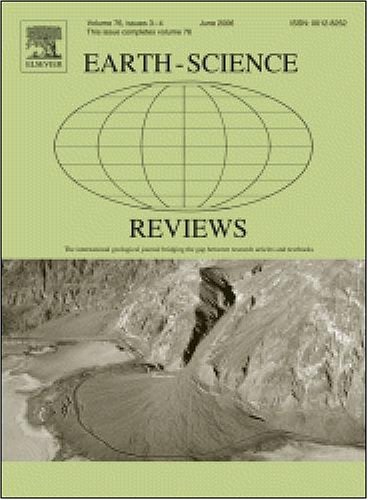Microbial ecology in hypersaline coastal lagoons: A model for climate-induced coastal salinisation and eutrophication
IF 10
1区 地球科学
Q1 GEOSCIENCES, MULTIDISCIPLINARY
引用次数: 0
Abstract
Coastal lagoons are critical ecosystems providing essential habitats and ecosystem services, including carbon sequestration, nutrient cycling, and fisheries support. Yet, many coastal lagoons face growing threats from salinisation and eutrophication driven by climate change and human activities. Climate-induced salinisation arises from multiple factors, including elevated temperatures, enhanced evaporation, reduced precipitation and freshwater inputs, and rising sea levels that trigger upwelling and direct saline intrusion to lagoons. These fragile and complex environments offer valuable models for understanding how coastal zones worldwide respond to global change. This review examines how salinity shapes microbial community composition and biogeochemical processes in hypersaline lagoons. Elevated salinity reduces microbial α-diversity, favouring salt-tolerant taxa and restructuring nitrogen and carbon cycling. Key processes, such as nitrification, denitrification, and methane production are disrupted, altering nutrient retention, organic matter decomposition, and greenhouse gas emissions. Increased salinity also intensifies eutrophication, creating positive feedback loops that weaken ecosystem health and reduce carbon sequestration. Microbial communities exhibit adaptive responses, including osmoregulatory strategies and horizontal gene transfer, which support resilience under rising salinity. By synthesising evidence on these interactions, the review illustrates the importance of understanding microbial-mediated processes to inform the conservation and management strategies for coastal lagoons under climate and anthropogenically-induced salinity change.
高盐沿海泻湖的微生物生态学:气候引起的沿海盐碱化和富营养化模型
沿海泻湖是重要的生态系统,提供必要的栖息地和生态系统服务,包括碳固存、养分循环和渔业支持。然而,由于气候变化和人类活动,许多沿海泻湖面临着日益严重的盐碱化和富营养化威胁。气候引起的盐碱化是由多种因素引起的,包括温度升高、蒸发加剧、降水和淡水输入减少,以及海平面上升引发上涌和盐直接侵入泻湖。这些脆弱而复杂的环境为了解全球沿海地区如何应对全球变化提供了有价值的模型。本文综述了盐度如何影响高盐泻湖中微生物群落组成和生物地球化学过程。盐度升高降低了微生物α多样性,有利于耐盐分类群,重构氮和碳循环。硝化、反硝化和甲烷生产等关键过程被打乱,改变了养分保留、有机物分解和温室气体排放。盐度的增加也加剧了富营养化,形成了正反馈循环,削弱了生态系统的健康,减少了碳的固存。微生物群落表现出适应性反应,包括渗透调节策略和水平基因转移,支持盐度上升下的恢复能力。通过综合这些相互作用的证据,该综述说明了了解微生物介导过程对气候和人为引起的盐度变化下沿海泻湖的保护和管理策略的重要性。
本文章由计算机程序翻译,如有差异,请以英文原文为准。
求助全文
约1分钟内获得全文
求助全文
来源期刊

Earth-Science Reviews
地学-地球科学综合
CiteScore
21.70
自引率
5.80%
发文量
294
审稿时长
15.1 weeks
期刊介绍:
Covering a much wider field than the usual specialist journals, Earth Science Reviews publishes review articles dealing with all aspects of Earth Sciences, and is an important vehicle for allowing readers to see their particular interest related to the Earth Sciences as a whole.
 求助内容:
求助内容: 应助结果提醒方式:
应助结果提醒方式:


